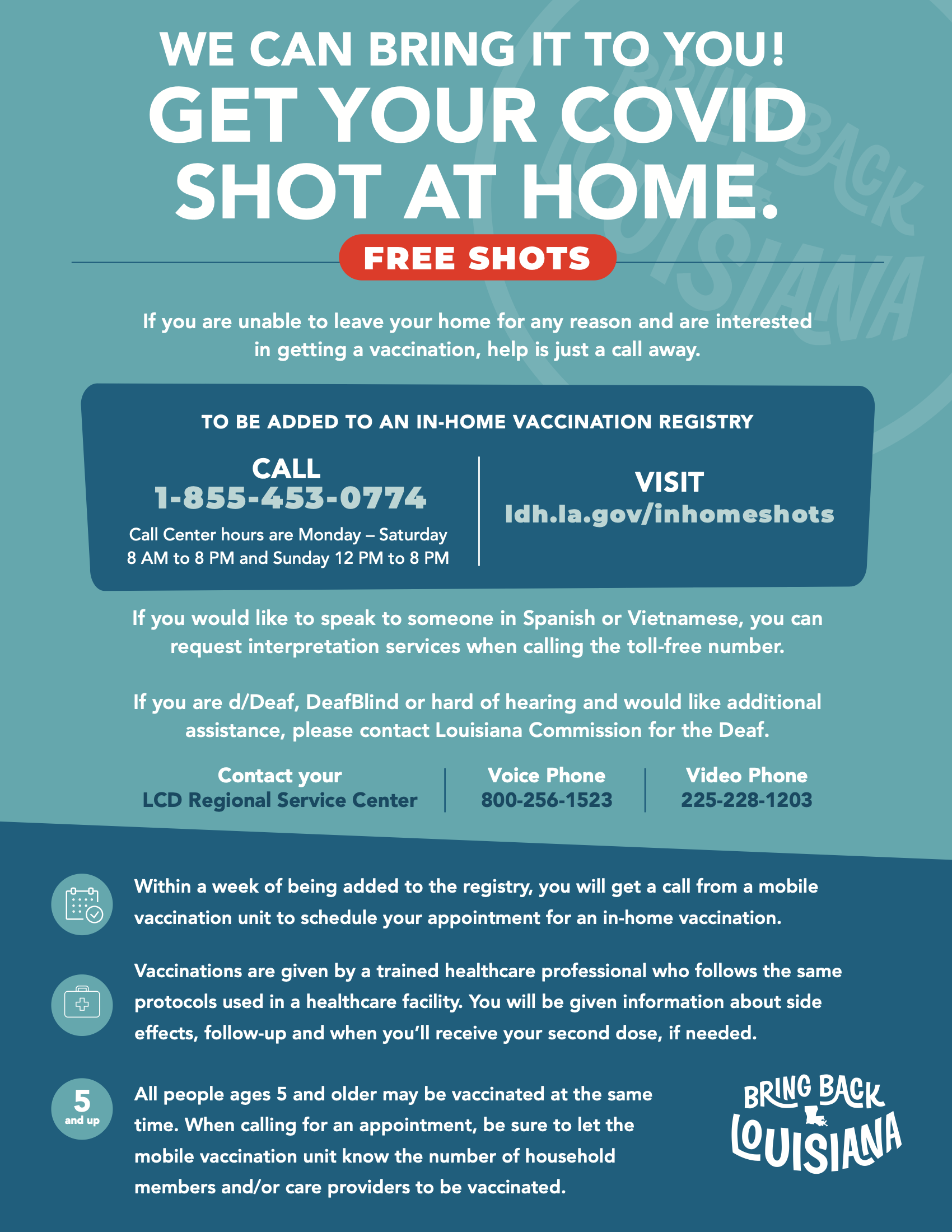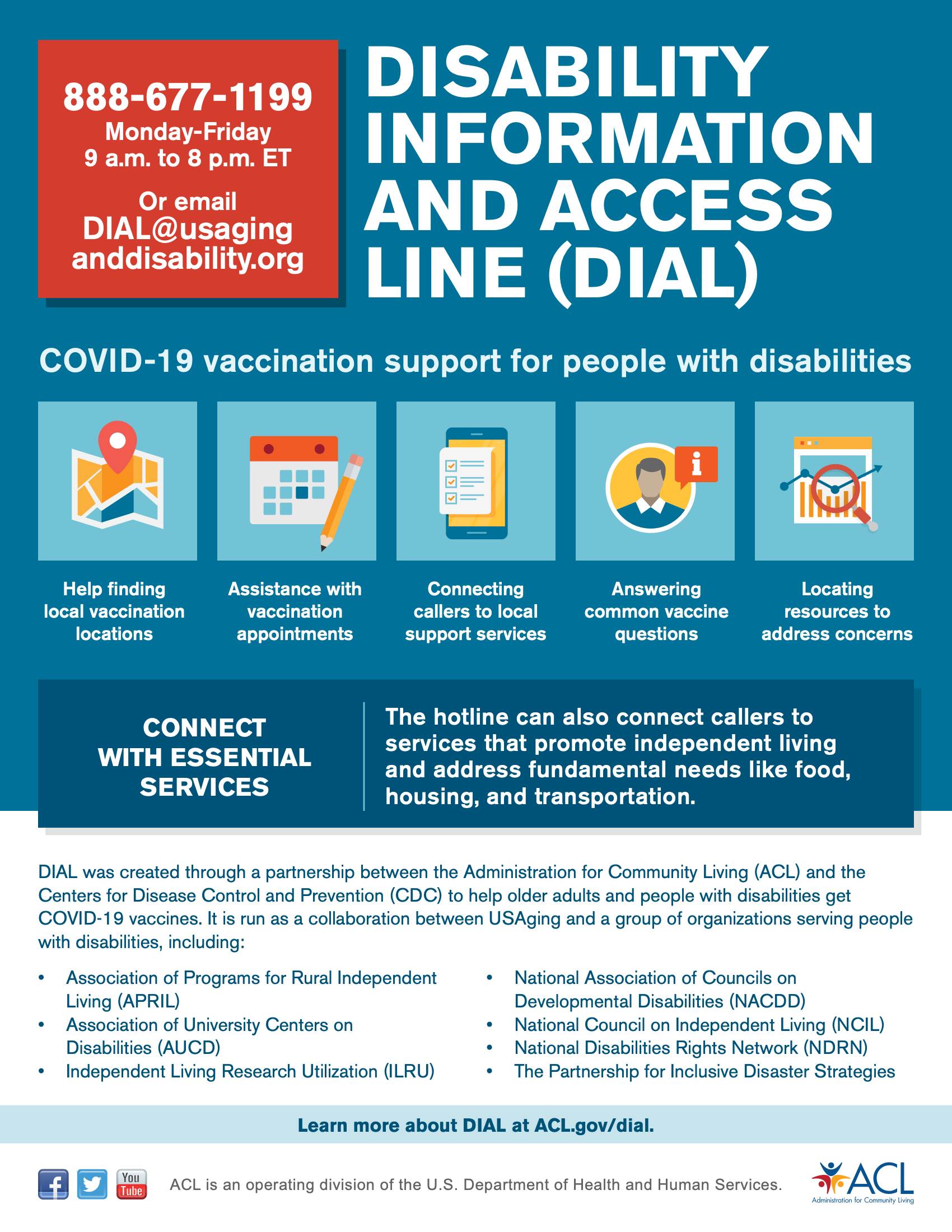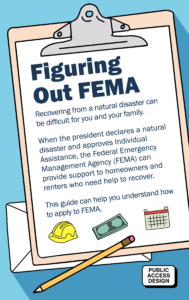We work to ensure equitable disaster planning and response. We aim to eliminate barriers to critical programs, services, and housing for people with disabilities who have been adversely impacted by disasters.
We assist with:
- FEMA disputes
- Obtaining necessary medicines or assistive devices from Medicaid
- Accessing personal care workers through a Medicaid Waiver
- Regaining contact with Louisiana Rehabilitation Services
- Obtaining special education services during evacuation
- Obtaining a sign language interpreter
- Referrals to community resources
For a link to view or download our flyer listing our services for help with disaster-related issues, click the button below:
Hurricane and Storm Resources
Overview: LA Emergency Preparedness Guide For Individuals With a Disability
This document compiles helpful resources geared towards people with disabilities to help make sure that you are prepared in case of an emergency. To view a downloadable copy of this document, click here:
FEMA’s READY Campaign
The Ready Campaign is a national public service campaign that helps prepare Americans for emergencies, and includes personal preparedness tips for people with disabilities in the event of a disaster.
For tips for people with disabilities on how to get informed, make a plan, get your benefits electronically, and build an emergency kit to meet your individual needs, visit the link below:
https://www.ready.gov/disability
Below are a few examples of the videos available from the Ready Campaign on personal disaster preparedness targeted to people with a range of disabilities.
These PSA’s emphasize the Ready Campaign’s four building blocks of preparedness – Be Informed, Make a Plan, Build a Kit and Get Involved.
Videos are available with open caption, and a certified deaf interpreter:
Personal Disaster Preparedness: I Use a Wheelchair
Personal Disaster Preparedness: I am Blind
Personal Disaster Preparedness: I am hard of hearing:
What Are The Rules for Service Animals?
What are the rules? How should you act around them? Everything you ever wanted to know.
But first, it’s important to know we’re talking about service animals, not pets, not emotional support animals or therapy animals. There are different rules and different states for each of them, but a service animal is described by the Americans with Disabilities Act, a federal law, and the rules are the same everywhere in the US.
Watch this video from Disability Rights Florida for answers to these questions, and more helpful information:
Hurricane Resources from Ready.gov:
Below is a link to a page with general resources to help individuals and families prepare for and survive during a hurricane.
https://www.ready.gov/hurricanes
Figuring Out FEMA: A Guide to Help you Apply to FEMA
This 7 page graphic guide contains helpful contact information, deadlines, tips, and explanations of how to apply, your rights to reasonable accommodations, appeals, and the process for obtaining legal help.
FEMA (Federal Emergency Management Agency) has released these helpful videos in American Sign Language to assist with hurricane preparation:
Hurricane Season and Flood Insurance (ASL PSA)
Applying for Disaster Assistance (ASL PSA)
Registration Steps for Disaster Assistance (ASL PSA)
Hurricane Preparedness (ASL PSA)
Partnership For Inclusive Disaster Strategies – Disability & Disaster Hotline:
Call/Text: +1 (800) 626-4959
Email: hotline@disasterstrategies.org
This hotline that provides information, referrals, guidance, technical assistance and resources to people with disabilities, families, allies, and organizations assisting disaster impacted individuals with disabilities and others seeking assistance with immediate and urgent disaster-related needs.
The Disaster Hotline is always available for intake calls, 24 hours a day, 7 days a week, 365 days a year. Their hotline team is led by experts on the many issues affecting people with disabilities in disasters and strategies for meeting those immediate needs. The team will respond to your call as soon as possible, often immediately, and intends to respond to all callers within 24 hours.
They can provide accessible and multilingual information to callers, including via videophone for Deaf callers, upon request to hotline@disasterstrategies.org.
For more information, visit: https://disasterstrategies.org/hotline/
Changes to FEMA Programs in 2024
Reforming Individual Assistance: New Benefits and Streamlined Processes to Help Disaster Survivors
In 2024 FEMA has made major changes to their Individual Assistance (IA) programs to address historic challenges faced by disaster survivors.
These updates include:
• Flexible funding provided directly to survivors when they need it most.
• Expanded eligibility to help more people recover faster.
• Simplified application process to meet survivors’ individual needs.
• Easier-to-navigate websites to apply for assistance and transitional shelter.
For more information from FEMA, visit:
https://www.fema.gov/assistance/individual/2024-reformhttps://www.fema.gov/assistance/individual
On Monday, January 22nd, The Partnership for Inclusive Disaster Strategies hosted a community call with FEMA Office of Disability Integration and Coordination (ODIC) Director Sherman Gillums, Jr. and stakeholders from across the country, for an hour-long conversation on what to expect from the FEMA disaster assistance changes. Director Gillums shared more information about the reforms, how the changes relate to people with disabilities, and answered questions from stakeholders.
Click on the link below for the video recording, and check out the resources listed for more information.
https://disasterstrategies.org/community-call-on-fema-reforms-with-odic/
On March 22, 2024, the FEMA Individual Assistance (IA) Reforms took into effect for the next Federally Declared Disaster. Read more at the link below. There you will find nine (9) FEMA Quick Reference Guides in English and Spanish that outline the IA Reforms for public education.
https://disasterstrategies.org/fema-ia-reforms-quick-reference-guides/
This resource from FEMA educates emergency responders to help ensure equitable response for people with disabilities:
Shortening the Disaster Cycle for Everyone: Disability Integration Through Equitable Emergency Response — 14 Potential Points of Inequity in the Disaster Cycle
https://www.fema.gov/sites/default/files/documents/fema_odic-shortening-disaster-cycle-everyone_english.pdf
Other Helpful Resources for Disaster Preparation
Below are three documents from FEMA that contain helpful tips and reminders for emergency preparation:
Create Your Family Emergency Communication Plan
Document and Insure Your Property
DOWNLOAD PDF – VIETNAMESE
Safeguard Critical Documents and Valuables
This page from the Red Cross, geared towards Older Adults, contains outlined steps with helpful links and resources, that can help you know what to do before, during and after a disaster or emergency.
How to Prepare Before a Disaster Occurs:
Gather the information that will help you prepare for disasters and emergencies:
For a checklist with helpful tips geared towards Older Adults:
DOWNLOAD PDF IN SPANISH
For a hurricane safety checklist:
DOWNLOAD PDF IN SPANISH
For a fillable template for a Family Disaster Plan:
DOWNLOAD PDF IN SPANISH
For a fillable Emergency Contact Card:
DOWNLOAD PDF
FEMA, AARP Release New Resources to Help Local Communities Protect Older Adults Before, During and After Natural Disasters (click here for the full press release): READ MORE
As the United States enters peak hurricane season, FEMA and AARP have released new resources to help local officials and emergency managers protect older adults in their communities before, during and after natural disasters and support communities in mitigating the effects of extreme weather events.
The “Guide to Expanding Mitigation: Making the Connection to Older Adults,” released by FEMA and AARP, highlights how natural hazards uniquely affect older adults and provides recommendations for how emergency managers, planners, local officials and community members can include older adults in community efforts to lower their risks.
The AARP Disaster Resilience Tool Kit features strategies to help local, state and community leaders and advocates reduce the risk and impacts of disasters on older adults.
State and Local Resources
Louisiana Governor’s Office of Homeland Security “Get a Game Plan” Website – Getagameplan.org – website containing links to download the FEMA mobile app and other helpful apps, find helpful resources, tips and relevant contact information (including links to each parish’s Office of Homeland Security and Emergency Preparedness), and forms to help you make plans for emergencies. Resources geared towards people with disabilities are featured at https://www.getagameplan.org/make-a-plan/individuals-with-disabilities/
Louisiana Guide to Supports & Services for Individuals with Disabilities, Elders and Their Families Affected by Disasters – https://gov.louisiana.gov/assets/Programs/GODA/statewide-resource-guide-2020-07.pdf
Contains links and contact information to statewide agencies serving people with disabilities affected by disasters.
Disasterassistance.gov – The Disaster Assistance Improvement Program, managed by FEMA, established this website that allows you to:
* Find disaster assistance that meets your personal needs.
* Learn about more than 70 forms of assistance from 17 federal agencies.
* Apply for disaster assistance online.
* Check the status of your application.
* Find a FEMA Disaster Recovery Center (DRC) near you.
* Get help with housing.
* Find programs to help with food and nutrition needs.
* Change the address for your Social Security, VA, or other federal benefits.
* Learn about Small Business Administration (SBA) loans for homeowners, renters, and businesses.
* The site also provides resources to help you learn how to prepare for, respond to, and recover from disasters.
National Disaster Attorney Guidebook – published by the Equal Justice Works Program and American Bar Association, Young Lawyers’ Edition
https://www.equaljusticeworks.org/wp-content/uploads/2022/02/Disaster-resilience-Ebook_FINAL.pdf
This Guidebook is intended to serve as an overview of disaster assistance available under various state and federal laws, the steps that an attorney advocate should take to help ensure that this assistance reaches low income disaster survivors, and practice pointers to guide the advocate in representing clients. Law and policy discussed in this Guidebook are subject to periodic change.
FEMA Individual Assistance Program and Policy Guide (IAPPG)
https://www.fema.gov/sites/default/files/documents/fema_iappg-1.1.pdf The IAPPG consolidates information on Individual Assistance (IA) programs offered by FEMA to a state, local, territorial, or tribal government jurisdiction affected by a disaster.
Entergy Power to Care program
https://www.entergy-louisiana.com/userfiles/content/your_home/docs/LOUISIANA_P2C_Agencies.pdf
FEMA Updates Digital Preparedness Tools
FEMA has two new ways to help people in Louisiana be better prepared for severe weather and hurricanes: 1) the redesigned FEMA app for smartphones and 2) the updated text-to-shelter service.
Smartphone App
FEMA recently released a redesigned smartphone app that gives users more personalized options. Downloading the app and then setting preferences is a simple way for Louisianans to be better prepared as we enter peak hurricane season. Users can enter their location and the app will show them the information they need. Users also can enter up to four other locations, so they can get information relevant for family and friends or to their workplace.
The Recover section opens with the basics about federal disaster declarations and continues with frequently asked questions about applying for assistance. The Preparedness section has been re-worked, with topics listed under Latest and A-Z sections. And popular features such as weather alerts, emergency shelter locations and disaster recovery center information have been revamped to be more user-friendly.
The app has a Spanish language option. It’s available for free download on iOS or Android. Current users will need to update their app but they do not need to re-download.
Shelter Locator Texting
While the FEMA App has a lot to offer, disasters can disrupt communications systems, and mobile internet service may not be reliable. However, texting capabilities often remain unaffected. Plus, not everyone has a smartphone. That’s why the Text to Shelter service exists and was updated earlier this year.
Anyone needing shelter in a disaster can simply text “shelter” and their ZIP code to 43362 and they will get a list of nearby shelter locations. With the update, they will get a list of shelter addresses within 200 miles of the entered ZIP code, not only those shelters within that ZIP code.
988 – Suicide and Crisis Lifeline
(July 18, 2022) — The Louisiana Department of Health (LDH) has launched the 988 Suicide and Crisis Lifeline — the new 3-digit number that replaces the National Suicide Prevention Lifeline to make it easier for people to receive assistance during a mental health crisis.
COVID-19 Resources

ATTENTION: people in Louisiana who cannot leave their home for any reason can request at home vaccinations!
News from the Louisiana Department of Health:
Louisiana residents who cannot leave their home for any reason can get a free at-home COVID-19 vaccination.
The Louisiana Department of Health said that the health department is committed to making the COVID-19 vaccination available to anyone, with a special focus on people with disabilities that prevent them from leaving their home.
The goal of the In-Home Vaccination Program is to offer those who cannot easily venture out an easy way to get this important shot. Those who would benefit from this service can schedule an appointment online or by phone.
Individuals who cannot leave their homes and call the hotline will be given information about side effects, follow-up and when they will receive their second dose, if needed.
How to Make a Request
By phone: Call 855-453-0774 and request an appointment for an in-home vaccination. You will receive a follow-up call from your local mobile vaccination team to schedule your shot.
Online: Just go to https://ldh.la.gov/inhomeshots and fill out the form to request an appointment. You will receive a follow-up call from your local mobile vaccination team to schedule your shot.
For Spanish or Vietnamese
We offer translation services for anyone who needs an in-home COVID-19 shot. If you speak Spanish or Vietnamese, call our toll-free hotline at 855-453-0774 and ask for a translator.
For Deaf/Hard of Hearing
We offer assistance for people who are d/Deaf, DeafBlind, or hard of hearing and need an in-home shot. Just call the Louisiana Commission for the Deaf at 800-256-1523 (voice) or 225-228-1203 (video).

Do you need reliable transportation to your COVID-19 vaccination appointment?
Disability Information and Access Line – DIAL can help you find a ride. Get to your appointment safely and on time by calling them at 888-677- 1199.
COVID.GOV
Visit covid.gov for information, links, and helpful resources from the Center for Disease Control to keep yourself and others safe from COVID-19.
Call this number or visit the websites below for more information about actions which can help fight variants.
1-800-232-0233 (TTY 1-888-720-7489)
Vaccines
https://www.vaccines.gov/
Masks
Ventilation
https://www.cdc.gov/coronavirus/2019-ncov/prevent-getting-sick/interactive-ventilation-tool.html
Long Covid Resources – Recovery from infection with SARS-CoV-2, the virus that causes COVID-19, can vary from person to person. Most individuals seem to recover quickly and completely. However, some report symptoms that persist or emerge weeks or even months later. These sets of conditions are referred to as “Long COVID.”
This is a website developed by the White House and U.S. Department of Health and Human Services with information and links to services and supports for people experiencing Long COVID. You can also read the White House’s memorandum and fact sheet about the effects and the Biden Administration’s efforts regarding Long COVID.
CDC COVID-19 Toolkit for Older Adults and High Risk Individuals 11.20.22 – contains guidance and tools to help older adults and people at higher risk and those who serve or care for them make decisions, protect their health, and communicate with their communities. Includes resources with information on the COVID-19 vaccines, tips on self care as well as for caretakers of older and high risk individuals, resources for people with specific medical conditions, informational videos, PSAs and more
From the U.S. Department of Labor:
People with long COVID may be entitled to workplace accommodations.
If you know somebody with long COVID, share this link, with answers to common questions: Workers With Long COVID-19: You May Be Entitled to Workplace Accommodations
COVID-19 Accessible Resources – The Georgia Tech Center for Inclusive Design and Innovation (CIDI), with funding from the CDC Foundation and technical assistance from CDC is adapting COVID-19 materials into accessible formats for people with disabilities.
The project has created a microsite to house all of the materials which has now gone live. On the microsite, you can request embossed braille, download accessible Word Documents and PDFs, and register for upcoming webinars related to COVID-19 and people with disabilities. More accessible materials are coming soon.
COVID-19 Vaccine Fact Sheet in plain language:
This COVID-19 Vaccine fact sheet from Autistic Self Advocacy Network (ASAN) is available in two versions:
Easy Read Edition. The Easy Read version uses pictures along with large text, and has more white space.
Click here to download the Easy Read version of the COVID-19 Fact Sheet.
A Plain Language Version without accompanying graphics.
Click here to download the Plain Language version of the COVID-19 Fact Sheet.
Coronavirus ASL Hotline – Communication Service for the Deaf (CDC)’s free hotline brings the deaf community important and accessible information on COVID-19 in both American Sign Language (ASL) and English
National Disability Rights Network (NDRN) “Know Your Rights During COVID-19” video series -Videos on a wide variety of COVID-19 related topics that explain what your rights are & what to do if they are violated. Areas include transportation, housing, healthcare, prisons, Indian Health Services & medical rationing, and domestic violence
Medical/Health
Autism Society: Coronavirus Toolkit – provides COVID-19 information and resources by topic, including Mental Health & Respite, Modifying Routines, Lifestyle Supports, and more
Coping & Stress Management
Office of Behavioral Health (OBH) Free Counseling: Keep Calm Through COVID Hotline – free crisis telephone hotline providing trained, compassionate counselors to support Louisianans during this time
Behavioral Health Tip Sheet For Infectious Disease Outbreak – tips for social distancing, quarantine, and isolation provided by the Substance Abuse and Mental Health Services Administration (SAMHSA)
Talking to Young Children Isolated Due To CoronaVirus – tips provided by LSU Health
Coping with Stress During Infectious Disease Outbreaks – recommendations and warning signs provided by SAMHSA
Tips for the Public: Managing Your Stress – tips provided by TX Department of Health & Human Services

